1. The New Jim Crow: Mass Incarceration in the Age of Colorblindness by
Michelle Alexander: 'With dazzling candor, legal scholar Michelle Alexander argues that ‘we have not ended racial caste in America; we have merely redesigned it.'”
2. America's Constitution: A Biography by Akhil Reed Amar: 'Incisive, entertaining, and occasionally controversial, this ‘biography' of America's framing document explains not only what the Constitution says but also why the Constitution says it.”
3. Carnal Crimes: Sexual Assault Law in Canada, 1900-1975 by Constance Backhouse: 'Using a case-study approach, Constance Backhouse explores nine sexual assault trials from across the country throughout the twentieth century.”
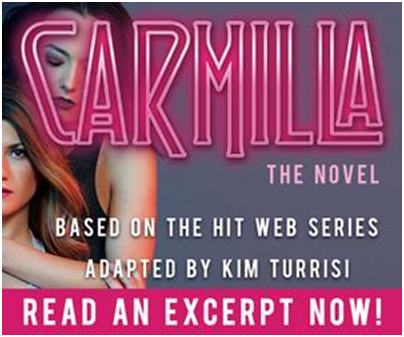
 4. Forcing the Spring: Inside the Fight for Marriage Equality by Jo Becker: 'Focusing on the historic legal challenge of California's ban on same-sex marriage, Becker offers a gripping, behind-the scenes narrative told with the lightning pace of a great legal thriller.”
4. Forcing the Spring: Inside the Fight for Marriage Equality by Jo Becker: 'Focusing on the historic legal challenge of California's ban on same-sex marriage, Becker offers a gripping, behind-the scenes narrative told with the lightning pace of a great legal thriller.”
5. The Common Legal Past of Europe, 1000-1800 by Manlio Bellomo:
'With a vigor and passion rarely found in a scholarly text, Manlio Bellomo has written a broad history of the western European legal tradition.”
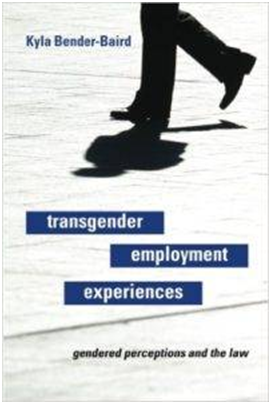
6. Transgender Employment Experiences: Gendered Perceptions and the Law by Kyla Bender-Baird: 'Using personal interviews, legal case histories, and transgender theory, Transgender Employment Experiencescombines policy analysis with the lived experiences of twenty transgender-identified employees, showing how worker protections that should exist under the Civil Rights Act are instead systematically undermined in the case of many transgender employees.”
7. Policing the National Body: Race, Gender and Criminalization in the United States edited by Anannya Bhattacharjee and Jael Silliman: 'Policing the National Body places issues of race, class, and gender at the center of its reproductive rights and social justice agenda by focusing on a key concern among women of color and poor communities today: the difficulty of maintaining families and sustaining community in the face of increasing criminalization.”
8. Madison's Hand: Revising the Constitutional Convention by Mary Sarah Bilder: 'James Madison's Notes on the 1787 Constitutional Convention have acquired nearly unquestioned authority as the description of the U.S. Constitution's creation. No document provides a more complete record of the deliberations in Philadelphia or depicts the Convention's charismatic figures, crushing disappointments, and miraculous triumphs with such narrative force. But how reliable is this account?”
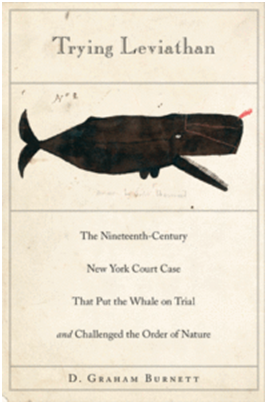
9. Trying Leviathan: The Nineteenth-Century New York Court Case That Put the Whale on Trial and Challenged the Order of Nature by D. Graham Burnett: 'In Trying Leviathan, D. Graham Burnett recovers the strange story of Maurice v. Judd, an 1818 trial that pitted the new sciences of taxonomy against the then-popular—and biblically sanctioned—view that the whale was a fish. The trial fueled a sensational public debate in which nothing less than the order of nature—and how we know it—was at stake.”
10. Let's Get Free: A Hip-Hop Theory of Justice by Paul Butler: 'Paul Butler was an ambitious federal prosecutor, a Harvard Law grad who gave up his corporate law salary to fight the good fight—until one day he was arrested on the street and charged with a crime he didn't commit.”
11. Policing the Planet: Why the Policing Crisis Led to Black Lives Matter edited by Jordan T. Camp and Christina Heatherton: 'Combining firsthand accounts from activists with the research of scholars and reflections from artists, Policing the Planet traces the global spread of the broken-windows policing strategy. It's a doctrine that has vastly broadened police power the world over—to deadly effect.”
12. Misconceptions: Unmarried Motherhood and the Ontario Children of Unmarried Parents Act, 1921-1969 by Lori Chambers: 'Chambers shows that the solutions to unwed pregnancy promoted in the reforms of 1921 were themselves based upon misconceptions. Misconceptionsargues that child welfare measures which simultaneously seek to rescue children and punish errant women will not, and cannot, succeed in alleviating child or maternal poverty.”
13. The Case Against the Supreme Court by Erwin Chemerinsky: 'In this devastating book, Erwin Chemerinsky—'one of the shining lights of legal academia” (The New York Times)—shows how, case by case, for over two centuries, the hallowed Court has been far more likely to uphold government abuses of power than to stop them.”
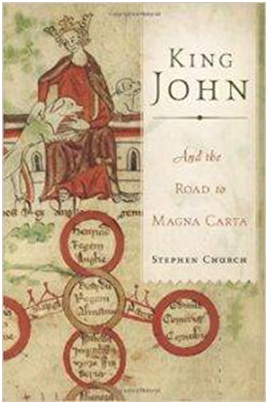
14. King John and the Road to Magna Cartaby
Stephen Church: 'In this authoritative biography, Church describes how it was that a king famous for his misrule gave rise to Magna Carta, the blueprint for good governance.”
15. Between the World and Me by Ta-Nehisi Coates: 'Americans have built an empire on the idea of ‘race,' a falsehood that damages us all but falls most heavily on the bodies of black women and men—bodies exploited through slavery and segregation, and, today, threatened, locked up, and murdered out of all proportion.”
16. Sisters in the Struggle : African-American Women in the Civil Rights-Black Power Movement edited by Bettye Collier-Thomas and V.P. Franklin: 'Women were at the forefront of the civil rights struggle, but their indvidiual stories were rarely heard. Only recently have historians begun to recognize the central role women played in the battle for racial equality.”
17. The Long, Lingering Shadow: Slavery, Race, and Law in the American Hemisphere by Robert Cottrol: 'Students of American history know of the law's critical role in systematizing a racial hierarchy in the United States. Showing that this history is best appreciated in a comparative perspective, The Long, Lingering Shadow looks at the parallel legal histories of race relations in the United States, Brazil, and Spanish America.”
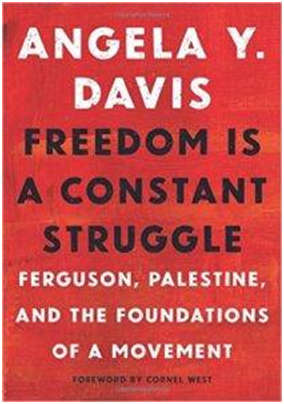
18. Freedom Is a Constant Struggle: Ferguson, Palestine, and the Foundations of a Movement by Angela Y. Davis: 'Reflecting on the importance of black feminism, intersectionality, and prison abolitionism for today's struggles, Davis discusses the legacies of previous liberation struggles, from the Black Freedom Movement to the South African anti-Apartheid movement. She highlights connections and analyzes today's struggles against state terror, from Ferguson to Palestine.”
19. Governing Immigration Through Crime: A Reader edited by Julie Dowling and Jonathan Inda: 'In the United States, immigration is generally seen as a law and order issue. Amidst increasing anti-immigrant sentiment, unauthorized migrants have been cast as lawbreakers. Governing Immigration Through Crime offers a comprehensive and accessible introduction to the use of crime and punishment to manage undocumented immigrants.”
20. You Have the Right to Remain Innocent by James Duane: 'Using actual case histories of innocent men and women exonerated after decades in prison because of information they voluntarily gave to police, Professor Duane demonstrates the critical importance of a constitutional right not well or widely understood by the average American. Reflecting the most recent attitudes of the Supreme Court, Professor Duane argues that it is now even easier for police to use your own words against you.”
21. A Legal History of the Civil War and Reconstruction: A Nation of Rights by Laura F. Edwards: 'Although hundreds of thousands of people died fighting in the Civil War, perhaps the war's biggest casualty was the nation's legal order. A Nation of Rights explores the implications of this major change by bringing legal history into dialogue with the scholarship of other historical fields.”
22. The Informant: A True Story by Kurt Eichenwald: 'In this gripping account unfolds one of the most captivating and bizarre tales in the history of the FBI and corporate America.”
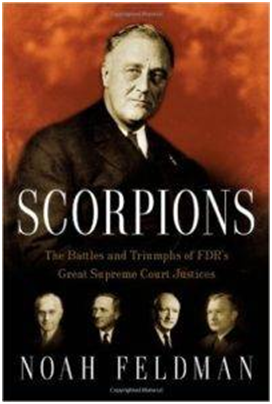
23. Scorpions: The Battles and Triumphs of FDR's Great Supreme Court Justicesby Noah Feldman: 'They began as close allies and friends of FDR, but the quest to shape a new Constitution led them to competition and sometimes outright warfare.”
24. Ballot Battles: The History of Disputed Elections in the United States by Edward Foley: 'In Ballot Battles, Edward Foley presents a sweeping history of election controversies in the United States, tracing how their evolution generated legal precedents that ultimately transformed how we determine who wins and who loses.”
25. Discipline & Punish: The Birth of the Prison by Michel Foucault: 'In this brilliant work, the most influential philosopher since Sartre suggests that such vaunted reforms as the abolition of torture and the emergence of the modern penitentiary have merely shifted the focus of punishment from the prisoner's body to his soul.”
26. Herculine Barbin (Being the Recently Discovered Memoirs of a Nineteenth Century French Hermaphrodite) edited by Michel Foucault: 'With an eye for the sensual bloom of young schoolgirls, and the torrid style of the romantic novels of her day, Herculine Barbin tells the story of her life as a hermaphrodite.”
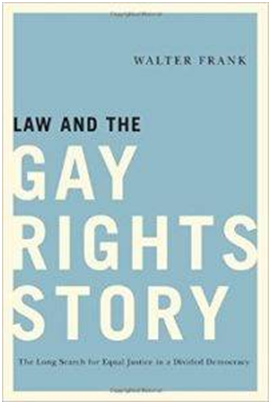
27. Law and the Gay Rights Story: The Long Search for Equal Justice in a Divided Democracy by Walter Frank: 'In his gripping new book, Walter Frank offers an in-depth look at the court cases that were pivotal in establishing gay rights. But he also tells the story of those individuals who were willing to make waves by fighting for those rights, taking enormous personal risks at a time when the tide of public opinion was against them.”
28. Law in America: A Short History by Lawrence M. Friedman: 'In the masterful hands of the subject's greatest living historian, the story of the evolution of our laws serves to lay bare the deciding struggles over power and justice that have shaped this country from its birth pangs to the present. Law in America is a supreme example of the historian's art, its brevity a testament to the great elegance and wit of its composition.”
29. The Legal Ideology of Removal: The Southern Judiciary and the Sovereignty of Native American Nations by Tim Garrison: 'This study is the first to show how state courts enabled the mass expulsion of Native Americans from their southern homelands in the 1830s. Our understanding of that infamous period, argues Tim Alan Garrison, is too often molded around the towering personalities of the Indian removal debate, including President Andrew Jackson, Cherokee leader John Ross, and United States Supreme Court Justice John Marshall. This common view minimizes the impact on Indian sovereignty of some little-known legal cases at the state level.”
30. Civil Rights Stories edited by Myriam Gilles and Risa Goluboff: 'These stories give the students and faculty members a deeper understanding of the historical and cultural background of the cases and an insight into their long term impact on the development of civil rights law.”
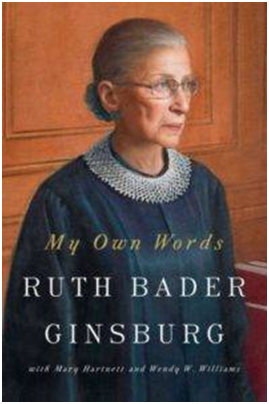
31. My Own Words by Ruth Bader Ginsburg: 'The first book from Ruth Bader Ginsburg since becoming a Supreme Court Justice in 1993—a witty, engaging, serious, and playful collection of writings and speeches from the woman who has had a powerful and enduring influence on law, women's rights, and popular culture.”
32. Lawyers and Legal Culture in British North America: Beamish Murdoch of Halifax by Philip Girard: 'From award-winning biographer Philip Girard, Lawyers and Legal Culture in British North America is the first history of the legal profession in Canada to emphasize its cross-provincial similarities and its deep roots in the colonial period.”
33. Unequal Freedom: How Race and Gender Shaped American Citizenship and Labor by Evelyn Nakano Glenn: 'The inequalities that persist in America have deep historical roots. Evelyn Nakano Glenn untangles this complex history in a unique comparative regional study from the end of Reconstruction to the eve of World War II.”
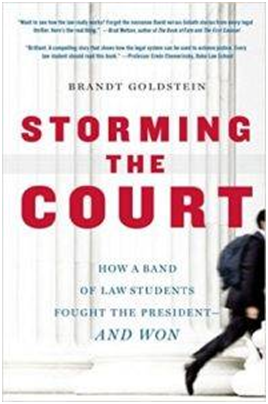
34. Storming the Court: How a Band of Law Students Fought the President—and Wonby Brandt Goldstein: 'In 1992, three hundred innocent Haitian men, women, and children who had qualified for political asylum in the United States were detained at Guantánamo Bay, Cuba—and told they might never be freed. Charismatic democracy activist Yvonne Pascal and her fellow refugees had no contact with the outside world, no lawyers, and no hope . . . until a group of inspired Yale Law School students vowed to free them.”
35. Inherently Unequal: The Betrayal of Equal Rights by the Supreme Court, 1865-1903 by Lawrence Goldstone: 'A potent and original examination of how the Supreme Court subverted justice and empowered the Jim Crow era.”
36. Vagrant Nation: Police Power, Constitutional Change, and the Making of the 1960s by Risa Goluboff: 'In 1950s America, it was remarkably easy for police to arrest almost anyone for almost any reason. The criminal justice system-and especially the age-old law of vagrancy-served not only to maintain safety and order but also to enforce conventional standards of morality and propriety. A person could be arrested for sporting a beard, making a speech, or working too little. Yet by the end of the 1960s, vagrancy laws were discredited and American society was fundamentally transformed. What happened?”
37. The Burger Court and the Rise of the Judicial Right by Michael J. Graetz and Linda Greenhouse: 'A revelatory look at the Warren Burger Supreme Court finds that it was not moderate or transitional, but conservative—and it shaped today's constitutional landscape.”
38. Becoming Justice Blackmun: Harry Blackmun's Supreme Court Journey by Linda Greenhouse: 'In this acclaimed biography, Linda Greenhouse of The New York Times draws back the curtain on America's most private branch of government, the Supreme Court. Greenhouse was the first print reporter to have access to the extensive archives of Justice Harry A. Blackmun (1908–99), the man behind numerous landmark Supreme Court decisions, including Roe v. Wade.”
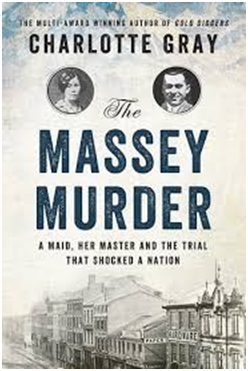
39. The Massey Murder: A Maid, her Master, and the Trial that Shocked a Nationby Charlotte Grey: 'In 1915 Carrie Davies, an 18-year old servant girl in the home of Charles (Bert) Massey, scion of the famous Massey family, shot and killed her employer as he entered his house after work. Remarkably, she was acquitted, and award winning popular historian Charlotte Gray explains how this happened.”
40. New York Times v. Sullivan: Civil Rights, Libel Law, and the Free Press by Kermit L. Hall and Melvin I. Urofsky: 'Illuminating a classic case from the turbulent civil rights era of the 1960s, two of America's foremost legal historians Kermit Hall and Melvin Urofsky provide a compact and highly readable updating of one of the most memorable decisions in the Supreme Court's canon.”
41. The Alien and Sedition Acts of 1798: Testing the Constitution by Terri Diane Halperin: 'In The Alien and Sedition Acts of 1798, Terri Diane Halperin discusses the passage of these laws and the furor over them, as well as the difficulties of enforcement.”
42. A Civil Action by Jonathan Harr: 'This true story of an epic courtroom showdown, where two of the nation's largest corporations were accused of causing the deaths of children from water contamination, was a #1 national bestseller and winner of the National Book Critics Circle Award.”
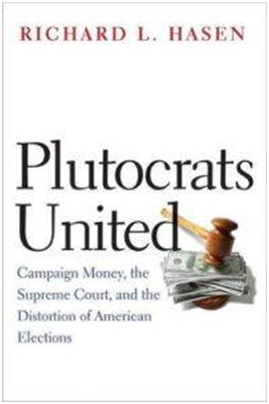
43. Plutocrats United: Campaign Money, the Supreme Court, and the Distortion of American Elections by Richard L. Hasen: 'Campaign financing is one of today's most divisive political issues. The left asserts that the electoral process is rife with corruption. The right protests that the real aim of campaign limits is to suppress political activity and protect incumbents. Meanwhile, money flows freely on both sides.”
44. The Great Dissent: How Oliver Wendell Holmes Changed His Mind—and Changed the History of Free Speech in America by Thomas Healy: 'Free speech as we know it comes less from the First Amendment than from a most unexpected source: Supreme Court Justice Oliver Wendell Holmes. A lifelong skeptic, he disdained all individual rights, including the right to express one's political views. But in 1919, it was Holmes who wrote a dissenting opinion that would become the canonical affirmation of free speech in the United States.”
45. Sisters in Law: How Sandra Day O'Connor and Ruth Bader Ginsburg Went to the Supreme Court and Changed the Worldby Linda Hirshman: 'The relationship between Sandra Day O'Connor and Ruth Bader Ginsburg—Republican and Democrat, Christian and Jew, western rancher's daughter and Brooklyn girl—transcends party, religion, region, and culture. Strengthened by each other's presence, these groundbreaking judges, the first and second women to serve on the highest court in the land, have transformed the Constitution and America itself, making it a more equal place for all women.”
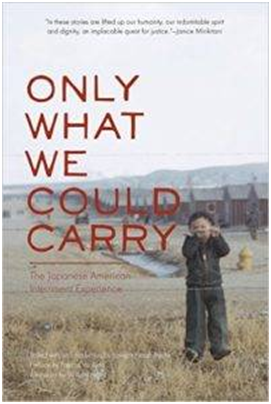
46. Only What We Could Carry: The Japanese American Internment Experience by Lawson Fusao Inada: 'In the wake of wartime panic that followed the Japanese attack of Pearl Harbor, more than 100,000 Japanese Americans residing along the West Coast of the United States were uprooted from their homes and their communities and banished to internment camps throughout the country.”
47. A People's History of the Supreme Court: The Men and Women Whose Cases and Decisions Have Shaped Our Constitution by Peter Irons: 'In the tradition of Howard Zinn's classic A People's History of the United States, Peter Irons chronicles the decisions that have influenced virtually every aspect of our society, from the debates over judicial power to controversial rulings in the past regarding slavery, racial segregation, and abortion, as well as more current cases about school prayer, the Bush/Gore election results, and ‘enemy combatants.'”
48. The Drone Memos: Targeted Killing, Secrecy, and the Lawby Jameel Jaffer: 'The Drone Memos collects for the first time the legal and policy documents underlying the U.S. government's deeply controversial practice of 'targeted killing”—the extrajudicial killing of suspected terrorists and militants, typically using remotely piloted aircraft or ‘drones.'”

49. No Constitutional Right to Be Ladies: Women and the Obligations of Citizenship by Linda K. Kerber: 'This pioneering study redefines women's history in the United States by focusing on civic obligations rather than rights. Looking closely at thirty telling cases from the pages of American legal history, Kerber's analysis reaches from the Revolution, when married women did not have the same obligation as their husbands to be ‘patriots,' up to the present, when men and women, regardless of their marital status, still have different obligations to serve in the Armed Forces.”
50. The Framers' Coup: The Making of the United States Constitution by
Michael J. Klarman: 'Based on prodigious research and told largely through the voices of the participants, Michael Klarman's The Framers' Coup narrates how the Framers' clashing interests shaped the Constitution–and American history itself.”
Join LAWyersClubIndia's network for daily News Updates, Judgment Summaries, Articles, Forum Threads, Online Law Courses, and MUCH MORE!!"
Tags :Others













